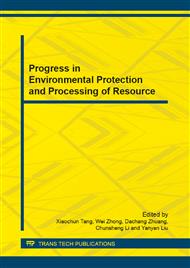p.551
p.555
p.560
p.564
p.568
p.581
p.586
p.590
p.594
Emergency Rescue Methods of Urban Raw Water Safety Based on Periphery Model of Raw Water System
Abstract:
Water safety is an important branch in the field of safety. By using the periphery theory and the similarity measure of Vague sets, the emergency rescue method of urban raw water safety which are used to meet the emergency demands with certain level of safety in emergencies were discussed. The periphery model of urban raw water system was established, and the mechanism of emergency rescue of raw water system to the safety was analyzed; the evaluation indicator system was constructed in two dimensions of pressure and support, and the principles for determining the control factors of emergency rescue of urban raw water safety were presented; the evaluation indicators were measured by formulas of similarity measure of Vague sets, and pressure indexes and support indexes of the periphery of the urban raw water system, as well as the formulas for emergency rescue of urban raw water safety were established; recommended evaluation standards for the emergency rescue degree of urban raw water safety in emergencies were provided, and methods to achieve the emergency rescue of urban raw water safety with certain safety level through emergency rescue control factors were put forward. With the raw water system of Chengdu as the background, application analysis of the established emergency rescue methods of urban raw water safety was conducted. The analysis results show that the established methods can achieve the emergency rescue of urban raw water safety with certain safety level in emergencies through the emergency rescue control factors and according to the emergency demands.
Info:
Periodical:
Pages:
568-580
Citation:
Online since:
February 2013
Authors:
Keywords:
Price:
Сopyright:
© 2013 Trans Tech Publications Ltd. All Rights Reserved
Share:
Citation:


